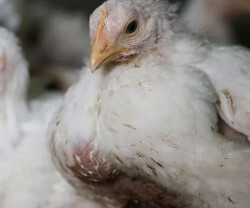New ‘Uncounted’ report explores chicken death rates on factory farms; 500 million die before slaughter
AnimalEquality.net
DECEMBER 4, 2024
factory farms. By analyzing data reported by the United States Department of Agriculture (USDA) in 2021, Animal Equality breaks down the death rates of chickens raised for meat at all stages of life—from hatchery to transportation trucks. Read the full report: Report: Mortality in broiler chickens… Source



































Let's personalize your content